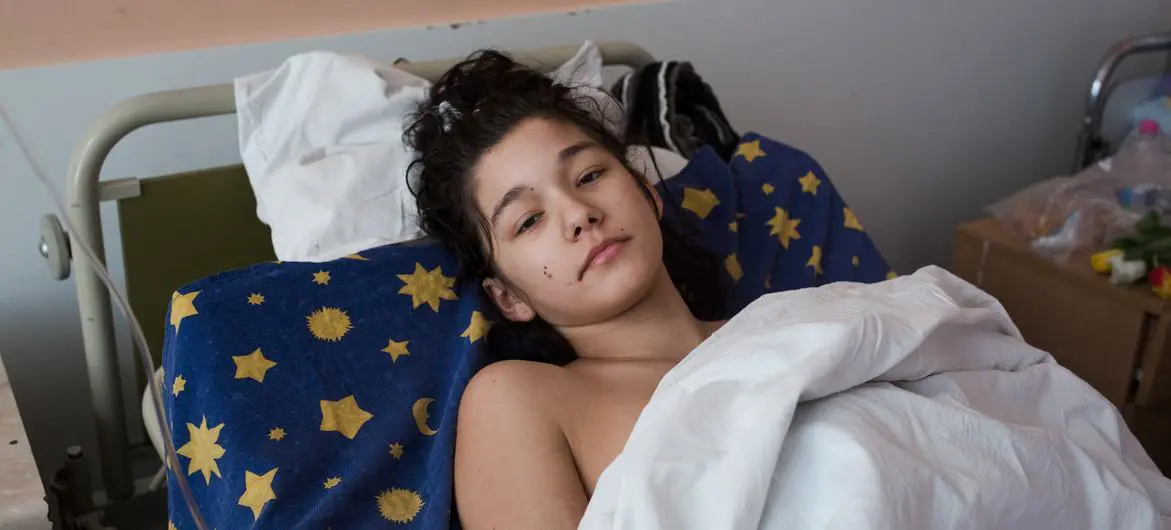Secretary-General António Guterres said on Sunday that he was appalled by an attack on a school in Bilohorivka, eastern Ukraine, where many people were sheltering from the ongoing fighting.
Bilohorivka is close to the Government-held city of Severodonetsk, where heavy fighting was reported in the suburbs on Saturday.
“This attack is yet another reminder that in this war, as in so many other conflicts, it is civilians that pay the highest price,” Spokesperson Stéphane Dujarric said in a statement on behalf of the UN chief.
According to news sources, President Volodymyr Zelensky said that around 60 people were killed after a bomb hit the school.
Supporting those ‘shattered by war’
One Ukrainian newspaper said that Bilohorivka had become a hot spot during fighting last week.
After Saturday’s attack, the UN chief again reiterated that civilians and civilian infrastructure “must always” be spared in times of war.
“This war must end, and peace must be established in line with the Charter of the United Nations and international law,” the statement continued, assuring that the UN and its humanitarian partners in Ukraine “will continue supporting those whose lives have been shattered by war”.

‘Blatant disregard for life’
At the same time, the head of the UN Children’s Fund (UNICEF), Catherine Russell tweeted out her strong condemnation.
“We do not yet know how many children might have been killed or injured in the reported bombing, but we fear this attack has just added to the hundreds of children who have already lost their lives in this war,” she said.
She echoed others in underscoring that schools must never be attacked or used for military purposes.
“Targeting civilians and civilian objects…is a violation of international humanitarian law,” she said, describing this latest attack as “blatant disregard for civilian lives”.
Mariupol evacuees
Mr. Guterres issued a second statement welcoming the arrival on Sunday of a new group of more than 170 civilians into Zaporizhzhia from the Azovstal steelworks and other areas of Mariupol.
The successful evacuation operation was coordinated by the UN and the International Committee of the Red Cross (ICRC).
“My thoughts are with them and all the people in Ukraine who are suffering in this war,” said the UN chief.
Determination applauded
He went on to thank everyone involved in the “complex operation”, including the leaders in Kyiv and Moscow who ensured the necessary humanitarian pauses.
“I applaud the determination and courage of the UN and ICRC teams on the ground,” he said.
This latest safe passage operation brings the number of civilians who have been safely evacuated from the Azovstal steelworks and other areas of Mariupol to over 600.
“I urge the parties to the conflict to spare no effort to secure safe passage for all those wishing to leave, in any direction they choose, and for aid to reach people in need,” the Secretary-General concluded.
Testimony of spirit
Meanwhile, the head of the World Health Organization (WHO), Tedros Adhanom Ghebreyesus, told journalists at a press conference in Kyiv yesterday that for the last two days he has been “deeply moved” by what he has seen and heard inside the country.
“My time here has affected me very personally. As someone…who grew up in a warzone myself, I understand only too well how the people of Ukraine feel – the worry for family and friends, the fear, the sense of loss and so on,” he said.
No stranger to the devastation of war, he lauded the “extraordinary resilience” of the Ukrainians.
“They have not given up [but] kept going, repairing essential services to stop the destruction [from] making a deeper hole in their lives,” said Tedros.

Creative modes of assistance
Since the war began in February, WHO has verified 200 attacks on health care in Ukraine.
The WHO chief spelled out that “these attacks must stop. Healthcare is never a target”.
He spoke of the bravery, humour and kindness that he witnessed amidst the suffering, along with stories of the “spontaneous, often ingenious ways” people have found to help and protect one another.
“Some of those I am talking about are our own WHO staff, who, although they have lost their homes, fear for their families, deal with daily uncertainty, and have kept working to support the health needs of the people of Ukraine,” Tedros said.
Most needed medicine: Peace
While the WHO team in Ukraine continues to work tirelessly to support the country and will do everything possible to back the Government in treating the injured, maintaining health services, and repairing the health system.
However, he pointed to “one medicine that WHO cannot deliver, and which Ukraine needs more than any other, and that is peace”.
“So, we continue to call on the Russian Federation to stop this war,” concluded the senior UN official.






